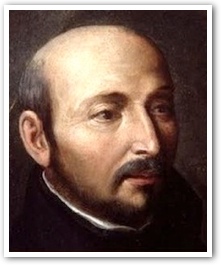Saint Ignatius of Loyola
- HANS URS VON BALTHASAR
By their relentless practicality the Spiritual Exercises of St. Ignatius shove the searcher into the center of the Gospel and leave him alone there with Christ, with the triune God who speaks to him.
 |
St. Ignatius of Loyola
1491-1556 |
In this way, the book sweeps away the hundreds of pious "manuals for perfection" that abounded during the high and late Middle Ages.
I used the word shove deliberately, for, in order to be sure to arrive at the center, one must first be stripped of his illusions about himself, his fantasies and sins, so that "naked he can follow the naked Christ," so that God's Word — Christ — can confront him personally, nose to nose. This happens not somewhere at the edges but in the center of his existence, so that the call becomes a turning point in his life.
"Being called" constitutes the sole center, meaning, and purpose of the whole book and is surrounded with much prudent advice "pertaining to a proper carrying out of one's call." The rest of the Exercises merely have to do with sharing Christ's path: Incarnation, birth, hidden and public life and work, Passion, Resurrection, and the founding of the Church.
What is supposed to happen is the same thing that happened long ago on the bank of the Jordan. "As Jesus was passing by," and Ignatius emphasizes that Jesus is not stationed somewhere but rather is always passing by, "John looked at him and said, 'Behold the Lamb of God.' The two disciples heard what he said and followed Jesus. But Jesus turned around and, seeing them following him, asked them, 'What are you seeking?'"
When they reply "Rabbi, where are you staying?" he answers, "Come and see" (Jn 1:36-39).
Make up your mind to come, which means "drop everything" (Lk 5:11), and you shall see. "And they went along and saw...and stayed." What happened back then is not merely a model but is exactly the same thing that happens today, in the here and now, just as the sacrifice of the cross is present in this holy Mass, just as the Resurrection Day's remission of sins takes place in each true confession.
 This is Meaghen Gonzalez, Editor of CERC. I hope you appreciated this piece. We curate these articles especially for believers like you.
This is Meaghen Gonzalez, Editor of CERC. I hope you appreciated this piece. We curate these articles especially for believers like you.
Please show your appreciation by making a $3 donation. CERC is entirely reader supported.

Acknowledgement
Hans Urs von Balthasar. "Saint Ignatius of Loyola." excerpt from You Have Words of Eternal Life, Scripture Meditations (San Francisco: Ignatius Press, 1991).
This excerpt appeared in Magnificat in July 2013.
![]()
The Author

 Hans Urs von Balthasar (1905-88) was a Swiss theologian and widely considered to be one of the most important Catholic intellectuals and writers of the twentieth century. At his Requiem Mass, Cardinal Ratzinger declared von Balthasar the most learned man in Europe. His works include over a thousand books and articles. Von Balthasar died on June 26, 1988, one day before he was to be made a cardinal by Pope John Paul II.
Hans Urs von Balthasar (1905-88) was a Swiss theologian and widely considered to be one of the most important Catholic intellectuals and writers of the twentieth century. At his Requiem Mass, Cardinal Ratzinger declared von Balthasar the most learned man in Europe. His works include over a thousand books and articles. Von Balthasar died on June 26, 1988, one day before he was to be made a cardinal by Pope John Paul II.
Ignatius Press has been the predominant publisher of Hans Urs von Balthasar's writings in English, having published over sixty of his books (see here).
Copyright © 1991 Ignatius Press



